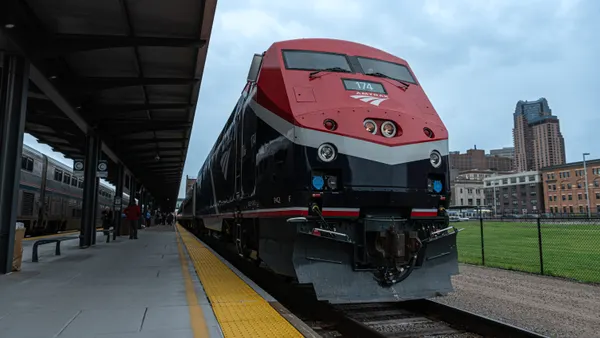Dive Brief:
- The Washington Metropolitan Area Transit Authority (WMATA) announced it will become "mobile ready" next year with a new app that would eventually allow customers to pay fares using a mobile device.
- Using the app, customers could check fares and get service information in real time. Modernizing the system’s infrastructure to accept mobile payments will be done in three phases, including installing new faregates at all 91 stations in the Metrorail system and new fareboxes on buses.
- "Mobile fare payment is the future of transit, giving customers the ability simply to tap their phone and go, all without stopping at a fare vending machine or using a separate card," Metro General Manager Paul Wiedefeld said in a statement.
Dive Insight:
Metro has been heavily criticized over the years in the DC region, although one of its major issues appears close to a solution with Virginia, Maryland and the DC Council slated to finalize a dedicated funding stream for the first time in the system’s history.
The use of mobile payments by transit customers is growing in the United States, particularly with the likes of Google Pay on the Las Vegas Monorail and Apple Pay in a few cities such as Chicago and Portland, OR. What may give some people pause in this latest announcement is each mobile provider will announce when its customers can use the app for payment, as it depends on "certain technical requirements to ensure quick transaction speeds," per the WMATA press release.
But there is definite precedent among some of WMATA’s regional partners. WTOP reports the Virginia Railway Express (VRE) commuter service has had a mobile app since 2015 for similar purposes. And with WMATA considering taking payments with key fobs, stickers or other chipped technology, it is clear officials are looking to give riders plenty of options to use for payment.
The execution of the agency’s planned modernization will also be interesting to follow, especially after capital projects like SafeTrack that caused major disruptions and inconveniences and came in for some heavy criticism from riders. The upgrades represent a major investment of time and money, as WMATA looks to replace its faregates and fareboxes and introduce new fare vending machines that it said will be "more user friendly with large touchscreens, better accessibility for customers with disabilities, multi-language support, and a smaller physical footprint." If the agency can do it on time and under budget, it could be a major boon.












